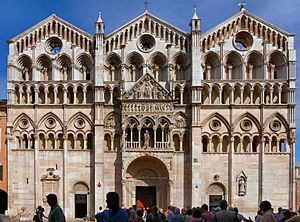October 1187 papal election facts for kids
Quick facts for kids Papal electionOctober 1187 |
|
|---|---|
| Dates and location | |
| 21 October 1187 Ferrara |
|
| Key officials | |
| Dean | Konrad von Wittelsbach |
| Camerlengo | Master Melior |
| Protopriest | Alberto di Morra |
| Protodeacon | Giacinto Bobone Orsini |
| Elected pope | |
| Alberto di Morra Name taken: Gregory VIII |
|
The October 1187 papal election was when a new Pope was chosen on October 21, 1187. This happened after Pope Urban III passed away. The Pope and his helpers, called the papal court, had just escaped from a city called Verona. They found safety in Ferrara, Italy. The very next day after Pope Urban III died, the election was held in Ferrara. The cardinals chose Cardinal Alberto Sartori di Morra to be the new Pope. He took the name Pope Gregory VIII. He was known to be friendly with the Emperor Frederick Barbarossa, who was very happy with this choice. However, Pope Gregory VIII was Pope for only about two months.
Choosing a New Pope
Popes and Emperors: A Tricky Time
Before this election, the Popes faced many challenges. For example, Pope Lucius III became Pope in 1181. He couldn't even be crowned in Rome because people there were against him. He had to go to another city, Velletri. When he finally returned to Rome, he was forced to leave again. This was because he wouldn't agree to certain old customs that earlier Popes had allowed.
The city of Rome was also fighting with a nearby town called Tusculum. Pope Lucius III supported Tusculum. When Rome attacked Tusculum, the Pope asked for help from the Emperor Frederick. The Pope wanted the Emperor to help him against the Romans.
There was also a big disagreement about land. A rich countess named Mathilda had left her lands to the Church. But Emperor Frederick claimed these lands belonged to him. The Emperor also wanted the Pope to crown his son, Henry, as Emperor. Pope Lucius III strongly refused.
Because of these disagreements, Emperor Frederick surrounded the Pope in Verona. He stopped people from talking to the Pope or appealing to him for help. Anyone caught trying to reach the Pope was put in prison and even tortured.
Pope Lucius III died in Verona in November 1185. The next day, the cardinals quickly and easily chose a new Pope. They picked Humbertus Crivelli, who was the Archbishop of Milan. He was known for being very strong-willed and against Emperor Frederick. He became Urban III.
Pope Urban III continued to disagree with Emperor Frederick. The Emperor kept the Pope and the cardinals trapped in Verona until 1187. Pope Urban III wanted to remove the Emperor from the Church, which is called excommunication. But the people of Verona begged him not to. Soon after, in September 1187, Pope Urban III and the cardinals managed to escape Verona. By October 3, they found safety in Ferrara. Pope Urban III died there on October 20, 1187.
The Election of Gregory VIII
Pope Urban III died in Ferrara because he was very sad about bad news from the Holy Land. The very next day, on October 21, 1187, thirteen cardinals who were in Ferrara began the process to choose the next Pope. They followed special rules that had been set by Pope Alexander III in 1179. According to these rules, at least nine votes were needed to elect a new Pope.
One of the cardinals considered for Pope was Henri de Marsiac. He realized he wouldn't get enough votes. He bravely stood up and said he was ready to travel and preach about a holy war, known as a crusade. He was reacting to the terrible news from the Holy Land.
Two other cardinals were also thought of: Paolo Scolari and Alberto di Morra. Paolo Scolari was very sick at the time, so he wasn't strong enough to be Pope.
The cardinals knew that Alberto di Morra, who was the Pope's main helper (called the papal chancellor), was well-liked by Emperor Frederick. This was because Alberto di Morra was part of the Emperor's group and even shared secret information with the Emperor.
In the end, the cardinals chose Alberto di Morra. On October 21, 1187, he was chosen by everyone. He became Pope Gregory VIII.
He was officially made a bishop and took his place as Pope on October 25. He was Pope for about two months. It is said that Emperor Frederick was very happy with this choice because Alberto was known to be fair and friendly towards him.
Sources
- Gregorovius, Ferdinand (1896). The History of Rome in the Middle Ages Vol. IV, part 2. London: George Bell 1896.
 | Sharif Bey |
 | Hale Woodruff |
 | Richmond Barthé |
 | Purvis Young |


